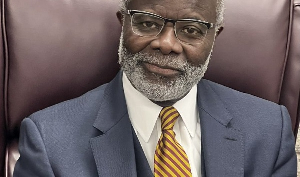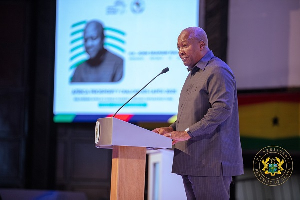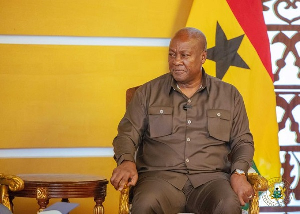... Just an Illusion
The dream of a United States of Africa inched closer to becoming a reality when African leaders met in Accra last month to discuss the subject and other matters facing the African continent. The summit meeting in the Ghanaian capital laid the groundwork for the full political integration of Africa. There were proposals for, among other things, the formation of a continental government, the establishment of a continental army, the creation of a common currency, and economic co-operation among the member states of the proposed union.Further discussions of these proposals and other issues were scheduled for a later date at the foreign ministerial level. It is indeed appropriate that both the occasion and the venue for this historic event were the 50th anniversary of Ghana’s independence and the capital city of Ghana respectively.
Ghana’s visionary first president, Kwame Nkrumah, for whom African emancipation and African unity were a passion, broached the idea of African political unification immediately after Ghana became independent in 1957. Without question, there is great potential in an Africa coming together as a single political entity. Indeed, any arrangement that enables nations as well as people to pool their resources and talents and share their burdens for the common good has virtue. Nonetheless, we are not convinced of the wisdom of a full-blown political integration at this stage in African history. Several attempts have been made in the past, albeit at the regional level, to achieve political integration in Africa, but none amounted to much for various reasons.
One of the first attempts was the Ghana-Guinea-Mali Union, whose formation was initiated by Nkrumah as a means of realizing his dream of a politically-united Africa. For all practical purposes, the Ghana-Guinea-Mali Union was a political entity in name only, lasting for as long as the brain behind it and its most enthusiastic supporter managed to keep himself in power in his own country. In 1966, when Nkrumah was toppled in a military coup, the Ghana-Guinea-Mali Union went down with him. Ghana’s new rulers were not interested in a political union with other countries when their own country was beset with serious internal political and economic problems.
The Mali Federation, composed of Senegal and Mali, was another serious effort at political integration, but the union between the two former French colonies in West Africa soon after their liberation hit the rocks after a few years. The leaders of both countries couldn't rise above their petty personal rivalries and ideological differences, one of them, Mali’s Modibo Keita, communist-leaning, the other, Senegal’s Leopold Senghor, a great admirer of Western culture. Then there was, in North Africa, the United Arab Republic, or UAR, which was a political union between Egypt and Syria concocted by Egypt’s Gamel Abdel Nasser, perhaps as a counterweight to Israel. The UAR barely got off the ground, again as a result of the intense rivalry between the leaders, in this instance Nasser and his Syrian counterpart Hafed Assad. While the problems that militated against previous attempts at continental government still exist, there are other issues that make translating the concept of political unity into reality such a daunting challenge. One of these issues is the mode of governance — an issue that could very well throw a monkey wrench into the whole project. The government and institutions of a unified Africa cannot be anything but one based on democracy or the rule of law. How can despotic rulers like Muamar Gadaffi of Libya and Robert Mugabe of Zimbabwe, citing two of the worst cases, be persuaded to conform to the requirements of democratic government in their little fiefdoms and submit to the writ of democratic authority at the federal Level? Government in every component state of a united Africa must be democratic, as is the case here in the U.S., which is easily the best model there is for continental government in the world. Another major issue that might not lend itself to easy solution has to do with sharing the wealth from natural resources. The natural resources of a nation belong to all the citizens of the nation, which the continent of Africa would become if political unification were achieved. Now, how does one explain to the ordinary citizens of, say, oil-rich Nigeria that henceforth their country’s oil wealth will be shared with the rest of the people of Africa when they themselves barely benefited from that oil wealth even when they didn’t have to share it with anyone?
Then there is the nearly intractable issue of ethnic and cultural divisions in Africa. The unpleasant truth is that there is more that divides Africans than unite them. If individual nation-states are at present having such a hard time forging a sense of community and belonging among their citizens, how can anyone expect the task to be any easier when it is magnified into a continental proportion?
A politically-integrated Africa does have a lot of promise for sure, but the road to achieving that goal is fraught with so many seemingly insurmountable hurdles as to make it an unrealistic proposition, at least for now. In their quest for African unity and ways to improve Africa’s chances for survival in an increasingly competitive world, perhaps the continent’s leaders should focus on more modest and attainable objectives such as the creation of regional economic organizations along the lines of ECOWAS, which is a grouping of West African states that co-operates in matters of trade and regional security. ECOWAS hasn’t done too badly, and its model should be replicated elsewhere in Africa instead of African leaders plunging posthaste into a continental government that may never work.
















